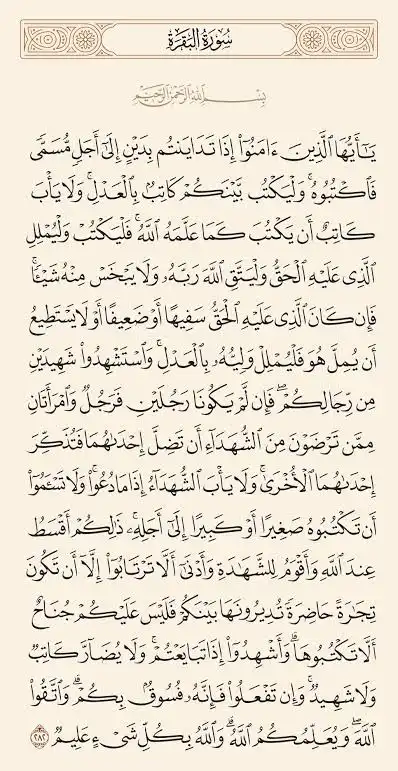The Longest Verse in Quran: Find Out

The longest verse in Quran is found in Surah Al-Baqarah, verse 282. This extensive verse outlines the guidelines for business dealings, debt, loans, and related financial matters.
Below, we provide the verse in its original Arabic, followed by its English translation, transliteration, and a detailed commentary to facilitate understanding and interpretation.
Longest Verse in Quran in Arabic
يَا أَيُّهَا الَّذِينَ آمَنُوا إِذَا تَدَايَنتُم بِدَيْنٍ إِلَىٰ أَجَلٍ مُّسَمًّى فَاكْتُبُوهُ ۚ وَلْيَكْتُب بَّيْنَكُمْ كَاتِبٌ بِالْعَدْلِ ۚ وَلَا يَأْبَ كَاتِبٌ أَن يَكْتُبَ كَمَا عَلَّمَهُ اللَّهُ ۚ فَلْيَكْتُبْ وَلْيُمْلِلِ الَّذِي عَلَيْهِ الْحَقُّ وَلْيَتَّقِ اللَّهَ رَبَّهُ وَلَا يَبْخَسْ مِنْهُ شَيْئًا ۚ فَإِن كَانَ الَّذِي عَلَيْهِ الْحَقُّ سَفِيهًا أَوْ ضَعِيفًا أَوْ لَا يَسْتَطِيعُ أَن يُمِلَّ هُوَ فَلْيُمْلِلْ وَلِيُّهُ بِالْعَدْلِ ۚ وَاسْتَشْهِدُوا شَهِيدَيْنِ مِن رِّجَالِكُمْ ۖ فَإِن لَّمْ يَكُونَا رَجُلَيْنِ فَرَجُلٌ وَامْرَأَتَانِ مِمَّن تَرْضَوْنَ مِنَ الشُّهَدَاءِ أَن تَضِلَّ إِحْدَاهُمَا فَتُذَكِّرَ إِحْدَاهُمَا الْأُخْرَىٰ ۚ وَلَا يَأْبَ الشُّهَدَاءُ إِذَا مَا دُعُوا ۚ وَلَا تَسْأَمُوا أَن تَكْتُبُوهُ صَغِيرًا أَوْ كَبِيرًا إِلَىٰ أَجَلِهِ ۚ ذَٰلِكُمْ أَقْسَطُ عِندَ اللَّهِ وَأَقْوَمُ لِلشَّهَادَةِ وَأَدْنَىٰ أَلَّا تَرْتَابُوا ۖ إِلَّا أَن تَكُونَ تِجَارَةً حَاضِرَةً تُدِيرُونَهَا بَيْنَكُمْ فَلَيْسَ عَلَيْكُمْ جُنَاحٌ أَلَّا تَكْتُبُوهَا ۗ وَأَشْهِدُوا إِذَا تَبَايَعْتُمْ ۚ وَلَا يُضَارَّ كَاتِبٌ وَلَا شَهِيدٌ ۚ وَإِن تَفْعَلُوا فَإِنَّهُ فُسُوقٌ بِكُمْ ۗ وَاتَّقُوا اللَّهَ ۖ وَيُعَلِّمُكُمُ اللَّهُ ۗ وَاللَّهُ بِكُلِّ شَيْءٍ عَلِيمٌ
Biggest Ayat In Quran Transliteration
Yaa ayyuhal lazeena aamanoo izaa tadaayantum bidaiynin ilaa ajalimmusamman faktubooh; walyaktub bainakum kaatibum bil’adl; wa laa yaaba kaatibun ai yaktuba kamaa ‘allamahul laah; falyaktub walyumlilil lazee ‘alaihil haqqu walyattaqil laaha rabbahoo wa laa yabkhas minhu shai’aa; fa in kaanal lazee ‘alaihil haqqu safeehan aw da’eefan aw laa yastatee’u ai yumilla huwa falyumlil waliyyuhoo bil’adl; wastash hidoo shaheedaini mir rijaalikum fa il lam yakoonaa rajulaini farajulunw wamra ataani mimman tardawna minash shuhadaaa’i an tadilla ihdaahumaa fatuzakkira ihdaahumal ukhraa; wa laa yaabash shuhadaaa’u izaa maadu’oo; wa laa tas’amooo an taktuboohu sagheeran awkabeeran ilaaa ajalih; zaalikum aqsatu ‘indal laahi wa aqwamu lishshahaadati wa adnaaa allaa tartaabooo illaaa an takoona tijaaratan haadiratan tudeeroonahaa bainakum falaisa ‘alaikum junaahun allaa taktuboohan; wa ashidooo izaa tabaaya’tum; wa laa yudaaarra kaatibunw wa laa shaheed; wa in taf’aloo fa innahoo fusooqum bikum; wattaqul laaha wa yu’allimu kumul laah; wallaahu bikulli shai’in ‘Aleem.
Longest Verse in Quran in English
O you who believe! When you contract debts among yourselves for a stated period of time, write it down. Let a scribe write it down faithfully between you. No scribe should refuse to write, as Allah has taught him, so let him write, and let the one incurring the debt dictate, and let him fear Allah his Lord, and not diminish [the debt] at all. If the debtor is feeble-minded or incapacitated, or unable himself to dictate, then let his guardian dictate faithfully, and call to witness two men from among you; if two men are not available, then a man and two women, such as you choose, to act as witnesses, so that if one of them forgets, the other can remind her. The witnesses should not refuse when they are summoned. Do not be reluctant to write down your debts, whether small or large, together with the time of repayment; that is more equitable in the sight of Allah, more reliable as evidence, and more likely to prevent doubts among yourselves. But if it is a transaction which you carry out on the spot among yourselves, there is no blame on you if you do not write it down. Have witnesses present whenever you trade with one another, and let neither scribe nor witness suffer harm, for if you did cause them harm, it would be wickedness on your part. So fear Allah, for it is Allah Who teaches you. And Allah has full knowledge of all things.

The longest verse in the Quran, known as the “Verse of Debt,” addresses the crucial issue of debt and its formalization. Found in Surah Al-Baqarah, verse 282, this verse highlights the importance of managing financial obligations.
As one of the last revelations in the Quran, it emphasizes the significance of responsible borrowing and lending.
Recognizing the necessity of debt in facilitating economic growth, trade, and individual needs, God, in His wisdom, permits borrowing to promote positive development and transactions, underscoring the importance of ethical financial practices.
READ ALSO: Hayya Alal Falah and Hayya Alas Salah Meaning & Arabic
What Is The Longest Verse In The Quran Essentially About?
The longest verse in the Quran, known as the “Verse of Debt,” provides essential guidelines for financial transactions, debt, and credit. Key takeaways include:
- Permissibility of credit transactions with specified deadlines
- Importance of written documentation to avoid disputes
- Reliable scribes with good character should record transactions faithfully
- Debtors must disclose entire debts without diminishment
- Guardians can dictate debts on behalf of minors or incapacitated individuals
- Literacy and documentation are prescribed for preserving rights
- Contracts should be witnessed, with a minimum of two men or a man and two women
- Testimony of disbelievers and children is not acceptable
- Men’s testimony is considered superior to women’s, with one man’s testimony equal to two women’s
- Witnesses must testify when summoned, and refusing to do so is not permissible.
These guidelines aim to promote transparency, fairness, and accountability in financial dealings, reflecting Allah’s wisdom and compassion.






